
This past year in Louisiana’s St. John the Baptist Parish, a small group of residents began organizing their community to compel the state to protect them against an invisible menace: the air they breathe. Their parish, the Louisiana equivalent of a county, is situated in what’s known as Cancer Alley, an industrial corridor between Baton Rouge and New Orleans that hosts more than 100 petrochemical factories.
At the helm of the battle is the Concerned Citizens of St. John, a diverse group of parish residents pushing back against the area’s historically bad — and worsening — industrial pollution. “One thing we all have in common is a desire for clean air,” the group’s founder, Robert Taylor, told me. Over the next year, the burgeoning group plans to get political and broaden its reach by banding together with similar groups in the region.
Taylor, a 76-year-old retired general contractor, recently spoke to me about the group from California, where he spent Christmas with his wife, who is recuperating from a stroke. Their extended family insisted Taylor keep his wife away from the Louisiana parish’s polluted air.
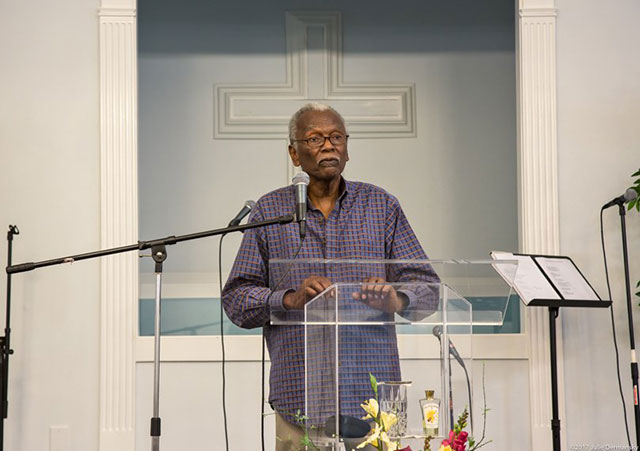 Robert Taylor at a Concerned Citizens of St. John meeting at the Tchoupitoulas Chapel in Reserve, Louisiana, on June 27.
Robert Taylor at a Concerned Citizens of St. John meeting at the Tchoupitoulas Chapel in Reserve, Louisiana, on June 27.
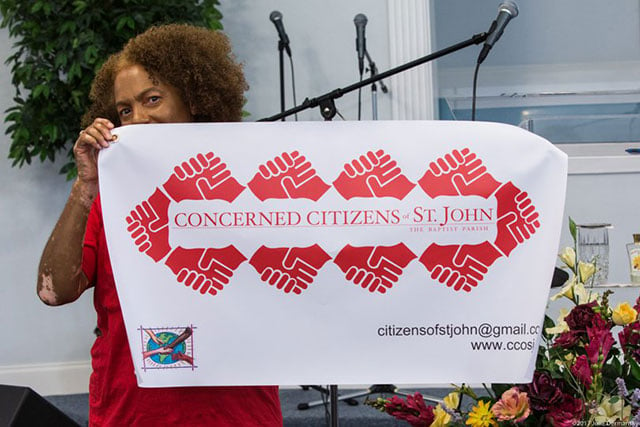 Lydia Gerard, a member of the Concerned Citizens of St. John, holding up a new sign at their public meeting on August 15.
Lydia Gerard, a member of the Concerned Citizens of St. John, holding up a new sign at their public meeting on August 15.
Coming Together for Cleaner Air
Taylor formed the Concerned Citizens of St. John after he and others learned that the US Environmental Protection Agency (EPA) determined residents in their area were at higher risk of cancer than anywhere else in the country. The EPA’s latest National Air Toxics Assessment, which evaluates air contaminants and estimates health risks, revealed that residents in six parish census tracts closest to the Denka Performance Elastomer factory in LaPlace have a lifetime risk of cancer from air pollution 800 times higher than the national average.
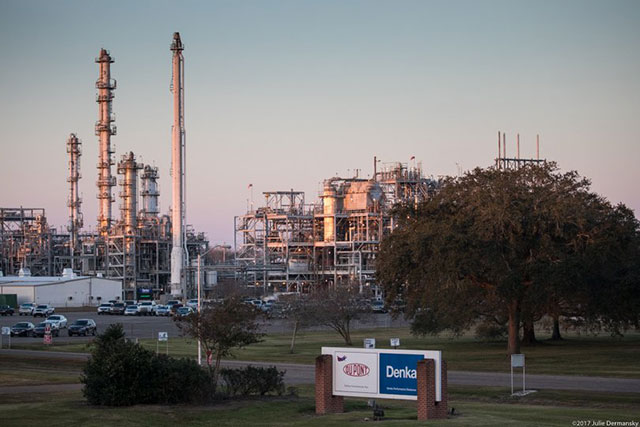 Denka Performance Elastomer factory in LaPlace, Louisiana.
Denka Performance Elastomer factory in LaPlace, Louisiana.
Denka’s LaPlace factory, formerly owned by DuPont, emits chloroprene and 28 other chemicals used to make the synthetic rubber commonly known as Neoprene. In 2010 the EPA reclassified chloroprene as a likely human carcinogen, but this fact only came to the community’s attention at the end of 2016.
The Concerned Citizens of St. John group holds bi-weekly public meetings at the Tchoupitoulas Chapel in the town of Reserve. At meetings throughout 2017, Wilma Subra, a technical advisor to the environmental advocacy group Louisiana Environmental Action Network (LEAN), reviewed the results of EPA air monitoring from six sites in the parish, which she will continue this year.
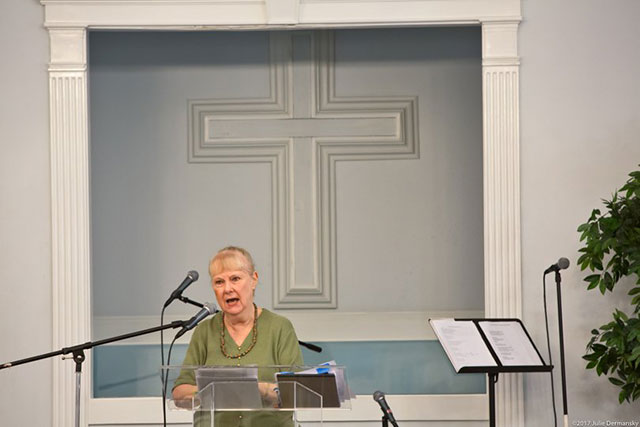 Wilma Subra, LEAN’s technical advisor, at a meeting of the Concerned Citizens of St. John the Baptist Parish in Reserve, Louisiana, on June 27, 2017.
Wilma Subra, LEAN’s technical advisor, at a meeting of the Concerned Citizens of St. John the Baptist Parish in Reserve, Louisiana, on June 27, 2017.
After the EPA’s concerns became public, Denka agreed to cut harmful emissions by up to 85 percent. Yet a year after air monitoring began, pollution levels were actually worse at five of the six sites. And that was despite the plant making costly improvements due to an agreement with regulators, according to CNN. On December 19, at the group’s last meeting of 2017, Subra went over the latest EPA data: Chloroprene emissions are, at times, still well above EPA-recommended standards.
As I documented Concerned Citizens throughout 2017 for DeSmog, I watched it grow into an advocacy force to be reckoned with — a unity and power they acknowledged at a Christmas celebration following their last meeting.
“The group had some growing pains over the course of the year, but we are now stronger than ever,” Taylor told me. “Our group can’t be influenced by anyone, which makes us dangerous.”
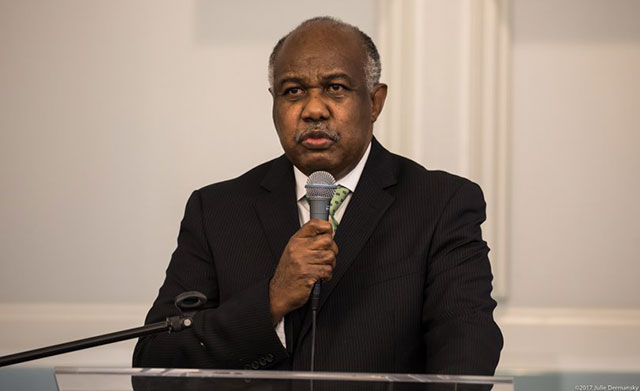 Pastor Lionel Murphy Jr. at the Tchoupitoulas Chapel in Reserve. Pastor Murphy made the church available as a meeting place for the Concerned Citizens of St. John. The church has been broken into three times since the meetings began.
Pastor Lionel Murphy Jr. at the Tchoupitoulas Chapel in Reserve. Pastor Murphy made the church available as a meeting place for the Concerned Citizens of St. John. The church has been broken into three times since the meetings began.
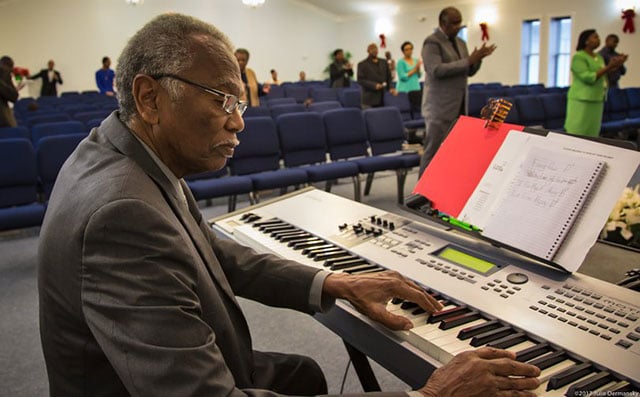 Robert Taylor, playing organ at a service held at the Tchoupitoulas Chapel in Reserve, where the Concerned Citizens of St. John holds most of its meetings.
Robert Taylor, playing organ at a service held at the Tchoupitoulas Chapel in Reserve, where the Concerned Citizens of St. John holds most of its meetings.
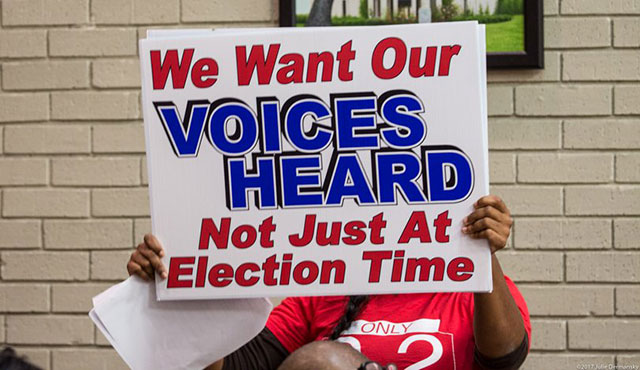 Shondrell Perrilloux holding a sign up as she takes the podium at a parish council meeting.
Shondrell Perrilloux holding a sign up as she takes the podium at a parish council meeting.
All Politics Is Local
In 2018 Concerned Citizens plans to find and back candidates to run for local offices in order to replace the politicians who brushed off their concerns in 2017. “Block by block, precinct by precinct, we are planning to choose candidates who will represent our interests over the industry’s,” Taylor said.
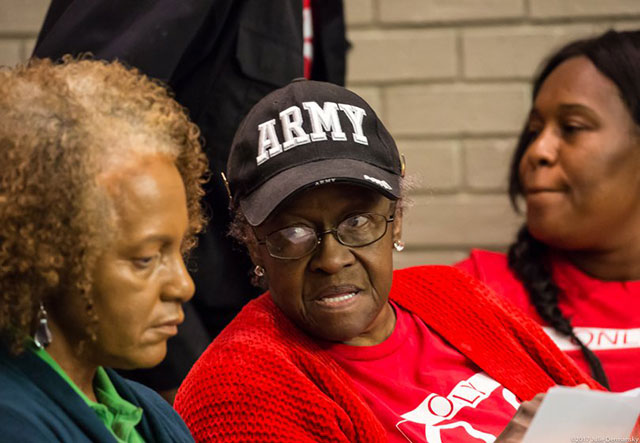 Geraldine Watkins (center), shown here at the November 29, 2017 parish council meeting, lives in LaPlace, less than a half mile from Denka’s plant.
Geraldine Watkins (center), shown here at the November 29, 2017 parish council meeting, lives in LaPlace, less than a half mile from Denka’s plant.
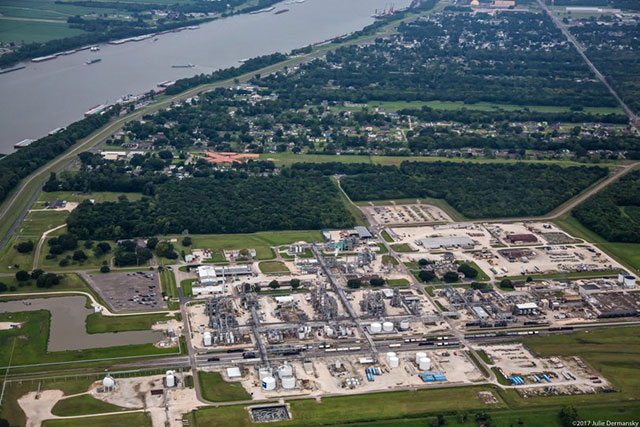 Denka Performance Elastomer factory in LaPlace is close to the 5th Ward Elementary School and residents’ homes in Reserve and LaPlace, Louisiana. Flight made possible by SouthWings.
Denka Performance Elastomer factory in LaPlace is close to the 5th Ward Elementary School and residents’ homes in Reserve and LaPlace, Louisiana. Flight made possible by SouthWings.
Geraldine Watkins, a 76-year-old great grandmother and member of Concerned Citizens, is considering running for office herself. Protecting the children who are forced to breathe the parish’s toxic air has become her life’s mission.
She has no intention of giving up the fight for clean air until Denka adheres to the EPA’s recommended emission standard of 0.2 micrograms per cubic meter, a figure printed on the red t-shirts the group wears.
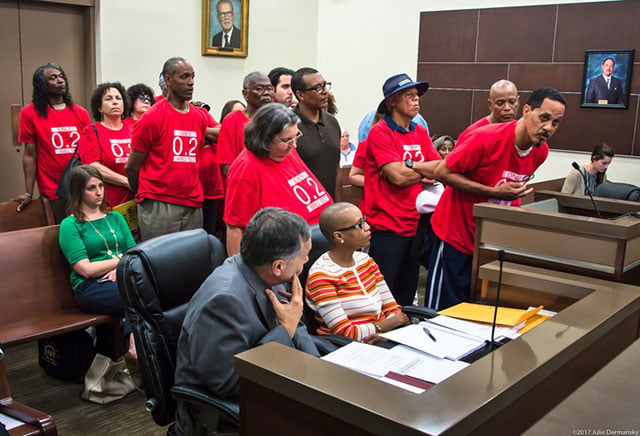 Members of Concerned Citizens of St. John at a parish council meeting in LaPlace, Louisiana, on March 28 wearing red t-shirts printed with “Only 0.2 will do,” emphasizing their point that chloroprene emissions should not exceed the EPA’s recommendation.
Members of Concerned Citizens of St. John at a parish council meeting in LaPlace, Louisiana, on March 28 wearing red t-shirts printed with “Only 0.2 will do,” emphasizing their point that chloroprene emissions should not exceed the EPA’s recommendation.
The EPA emissions limits are determined with the goal of keeping the cancer risk from air pollution to less than one in every million people. When that goal is not achievable, the agency sets standards based on the “upper limit of acceptability,” which is a risk of 100 in a million people. That figure is the basis for the EPA’s 0.2 micrograms per cubic meter standard in St. John the Baptist Parish.
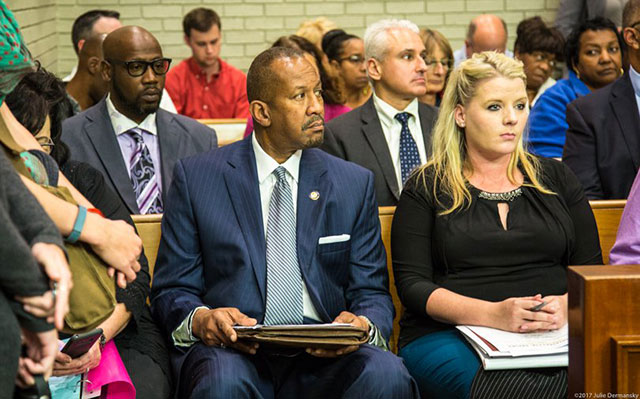 Louisiana Department of Environmental Quality (LDEQ) Secretary Dr. Chuck Brown before addressing the parish council on November 14.
Louisiana Department of Environmental Quality (LDEQ) Secretary Dr. Chuck Brown before addressing the parish council on November 14.
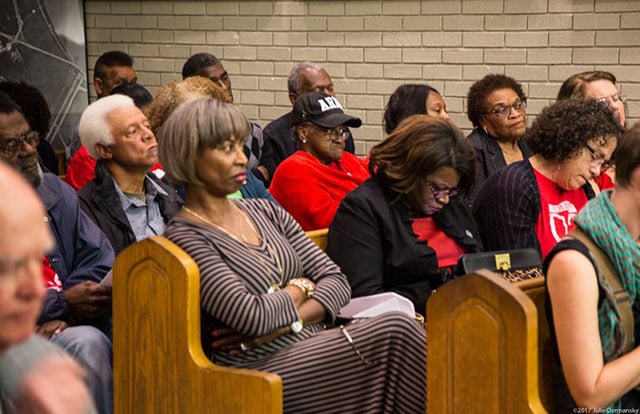 Members of the Concerned Citizens of St. John pack the November 14 parish council meeting the night LDEQ Secretary Dr. Chuck Brown updated the council, but the group members were not given a chance to ask him questions.
Members of the Concerned Citizens of St. John pack the November 14 parish council meeting the night LDEQ Secretary Dr. Chuck Brown updated the council, but the group members were not given a chance to ask him questions.
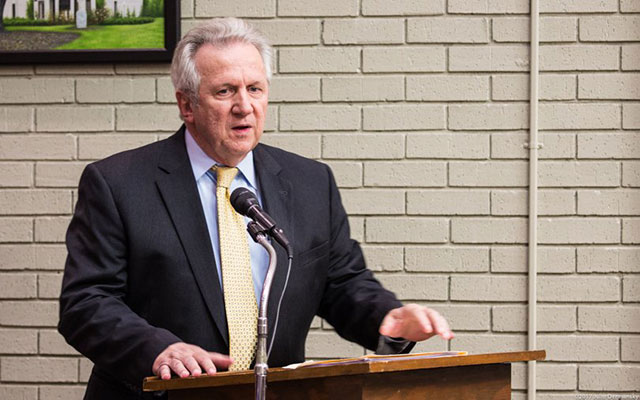 Louisiana’s state health officer Dr. Jimmy Guidry at the November 14, 2017, parish council meeting, saying there is no health emergency in the parish. At a December 2016 council meeting, however, he acknowledged that “no one should have to breathe chloroprene.”
Louisiana’s state health officer Dr. Jimmy Guidry at the November 14, 2017, parish council meeting, saying there is no health emergency in the parish. At a December 2016 council meeting, however, he acknowledged that “no one should have to breathe chloroprene.”
Denka and Dr. Chuck Brown, the state’s top environmental regulator, have challenged the EPA’s findings. Watkins and the other members of Concerned Citizens say they have no reason to believe the EPA got it wrong.
Though the EPA declined to comment when I asked if there were any problems with its findings on chloroprene, citing it as an open case, CNN reported that an EPA spokesperson said the science behind the agency’s findings was solid.
“We appreciate that the EPA warned us about the chloroprene,” Watkins told me, but it is clear to her that she and other parish residents “are mere guinea pigs in the scheme of things. The lack of action by the government since the EPA’s findings were released makes it complicit in allowing Denka and DuPont to poison us.”
In the new year, in addition to entering local politics, the Concerned Citizens of St. John also plan to form an alliance with other citizens groups in Cancer Alley which are also standing up to pollution.
“I’m not just fighting for myself. I’m fighting for everyone in the parish, especially the children,” Watkins said.
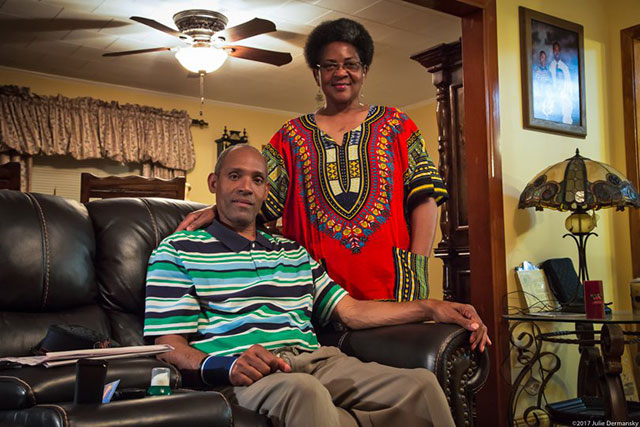 The Handys, residents of LaPlace who live across from Denka’s plant. George Handy, a member of the Concerned Citizens of St. John, purchased the house before learning about the local chloroprene emissions.
The Handys, residents of LaPlace who live across from Denka’s plant. George Handy, a member of the Concerned Citizens of St. John, purchased the house before learning about the local chloroprene emissions.
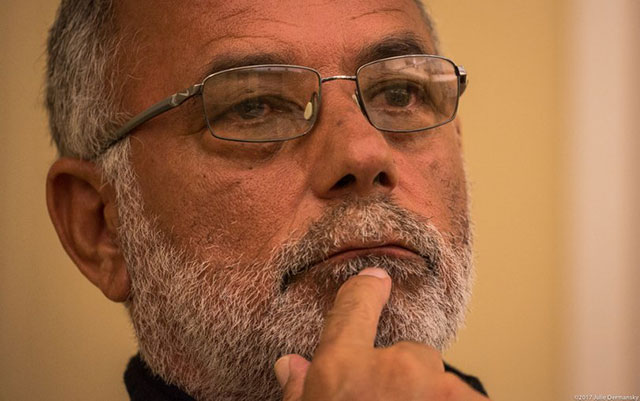 Councilmember Larry Sorapuru, the only councilmember in St. John the Baptist Parish who the concerned citizen group feels is standing up for them, speaking at a town hall meeting on pollution in LaPlace on November 26.
Councilmember Larry Sorapuru, the only councilmember in St. John the Baptist Parish who the concerned citizen group feels is standing up for them, speaking at a town hall meeting on pollution in LaPlace on November 26.
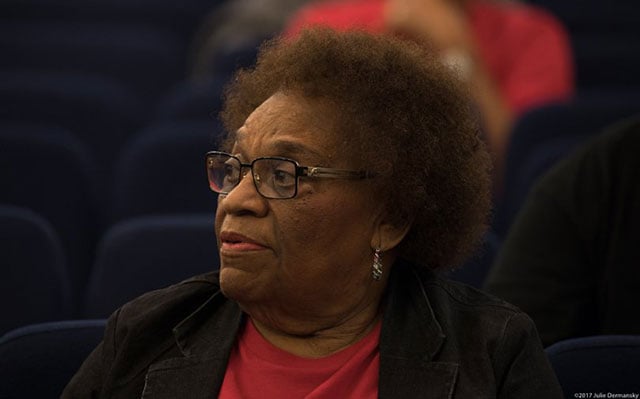 Mary Hampton, a member of the Concerned Citizens of St. John, listening to the results of the latest air monitoring test at a group meeting on December 18.
Mary Hampton, a member of the Concerned Citizens of St. John, listening to the results of the latest air monitoring test at a group meeting on December 18.
Help us Prepare for Trump’s Day One
Trump is busy getting ready for Day One of his presidency – but so is Truthout.
Trump has made it no secret that he is planning a demolition-style attack on both specific communities and democracy as a whole, beginning on his first day in office. With over 25 executive orders and directives queued up for January 20, he’s promised to “launch the largest deportation program in American history,” roll back anti-discrimination protections for transgender students, and implement a “drill, drill, drill” approach to ramp up oil and gas extraction.
Organizations like Truthout are also being threatened by legislation like HR 9495, the “nonprofit killer bill” that would allow the Treasury Secretary to declare any nonprofit a “terrorist-supporting organization” and strip its tax-exempt status without due process. Progressive media like Truthout that has courageously focused on reporting on Israel’s genocide in Gaza are in the bill’s crosshairs.
As journalists, we have a responsibility to look at hard realities and communicate them to you. We hope that you, like us, can use this information to prepare for what’s to come.
And if you feel uncertain about what to do in the face of a second Trump administration, we invite you to be an indispensable part of Truthout’s preparations.
In addition to covering the widespread onslaught of draconian policy, we’re shoring up our resources for what might come next for progressive media: bad-faith lawsuits from far-right ghouls, legislation that seeks to strip us of our ability to receive tax-deductible donations, and further throttling of our reach on social media platforms owned by Trump’s sycophants.
We’re preparing right now for Trump’s Day One: building a brave coalition of movement media; reaching out to the activists, academics, and thinkers we trust to shine a light on the inner workings of authoritarianism; and planning to use journalism as a tool to equip movements to protect the people, lands, and principles most vulnerable to Trump’s destruction.
We’re asking all of our readers to start a monthly donation or make a one-time donation – as a commitment to stand with us on day one of Trump’s presidency, and every day after that, as we produce journalism that combats authoritarianism, censorship, injustice, and misinformation. You’re an essential part of our future – please join the movement by making a tax-deductible donation today.
If you have the means to make a substantial gift, please dig deep during this critical time!
With gratitude and resolve,
Maya, Negin, Saima, and Ziggy